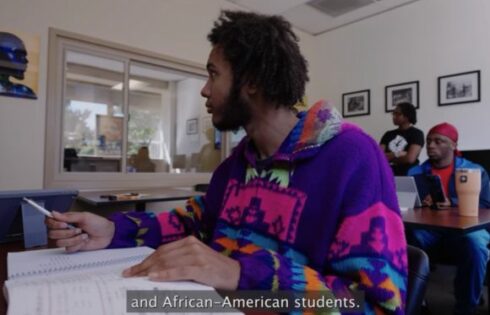
Asian, Latino students also honored
One of the largest universities in Virginia hosts nearly a dozen alternative graduation ceremonies, specially tailoring the events to fit numerous student backgrounds and demographics, including LGBT students and veterans.
The 10 “cultural achievement ceremonies” at Virginia Tech offer unique graduation events for numerous students, such as Jewish graduates, African Americans and Native Americans. The ceremonies “include a spectrum of underrepresented populations on campus, as well as graduates within the recovery community and military veterans,” according to a news release from the school.
The Donning of the Kente ceremony is “a celebration of achievement for Black and African American undergraduate, graduate, and Ph.D. candidates,” the school’s website states. The ceremony has been a longstanding tradition of Virginia Tech; the school was one of the first institutions in the state of Virginia to celebrate it, adopting the ceremony in 1995, according to the listing on the school’s website.
The ceremony utilizes the Kente cloth “as a symbol of African American heritage in the adornment of the graduation robe.” Kente is a type of cloth made in Ghana and worn by tribes there. During the ceremony, “each graduate can have one person join them on stage to acknowledge their achievements and adorn them with their Kente stole.”
Ceremony for gay, lesbian, transgender students
The university also hosts a “Lavender Commencement Ceremony,” an event which honors LGBTQ students.
The Lavender ceremony, like the Donning of the Kente, is not unique to Virginia Tech; it is held at numerous universities nationwide, including Yale, Harvard and Brown. According to the Human Rights Campaign, the ceremony was founded by Ronni Sanlo at the University of Michigan in 1995.
Lavender is considered an important color in LGBTQ history because “it is a combination of the pink triangle that gay men were forced to wear in concentration camps and the black triangle designating lesbians as political prisoners in Nazi Germany,” according to the Human Rights Campaign’s website
The activist organization states that the LGBTQ movement “took these symbols of hatred and combined them to make symbols and color of pride and community.”
Virginia Tech’s Lavender ceremony began in 2009, recognizing five graduating students, according to the university’s website. Attendees are “presented with a rainbow cord to wear during university and college ceremonies.”
The College Fix reached out to the various cultural departments to inquire about the history and traditions of these ceremonies, as well as the attendance at each one. Campus spokeswoman Hunter Gresham responded to those queries; she told The Fix that it would “take several days for [her] to gather this information,” and that furthermore she would be out of the office until June 3.
Ceremony for sober students
One of the university’s more unique graduation events is the Students in Recovery ceremony. That ceremony exists “because higher education can be a very challenging place for students in recovery,” the school’s website states.
“Creating an atmosphere that isn’t just substance free, but actively engages students in practical ways to stay healthy, is vital for students in recovery to achieve their goals,” the website continues.
The event was founded in the spring of 2016 with a grant from Transforming Youth Recovery, an organization aimed at “investing in the future of our youth and families by bringing research, solution-based programs and resources to substance use disorders, transforming the pathway for lifetime recovery.”
Other graduation ceremonies hosted by the university honor veterans, Muslims, Jewish students, international students, Asian Americans, and American Indian and Indigenous peoples. As with the other ceremonies, students who participate in these events receive special stoles or cords to wear at other graduations.
MORE: More than 75 universities now host blacks-only graduation ceremonies
IMAGE: Speaking Pix / Shutterstock.com
Like The College Fix on Facebook / Follow us on Twitter





Please join the conversation about our stories on Facebook, Twitter, Instagram, Reddit, MeWe, Rumble, Gab, Minds and Gettr.